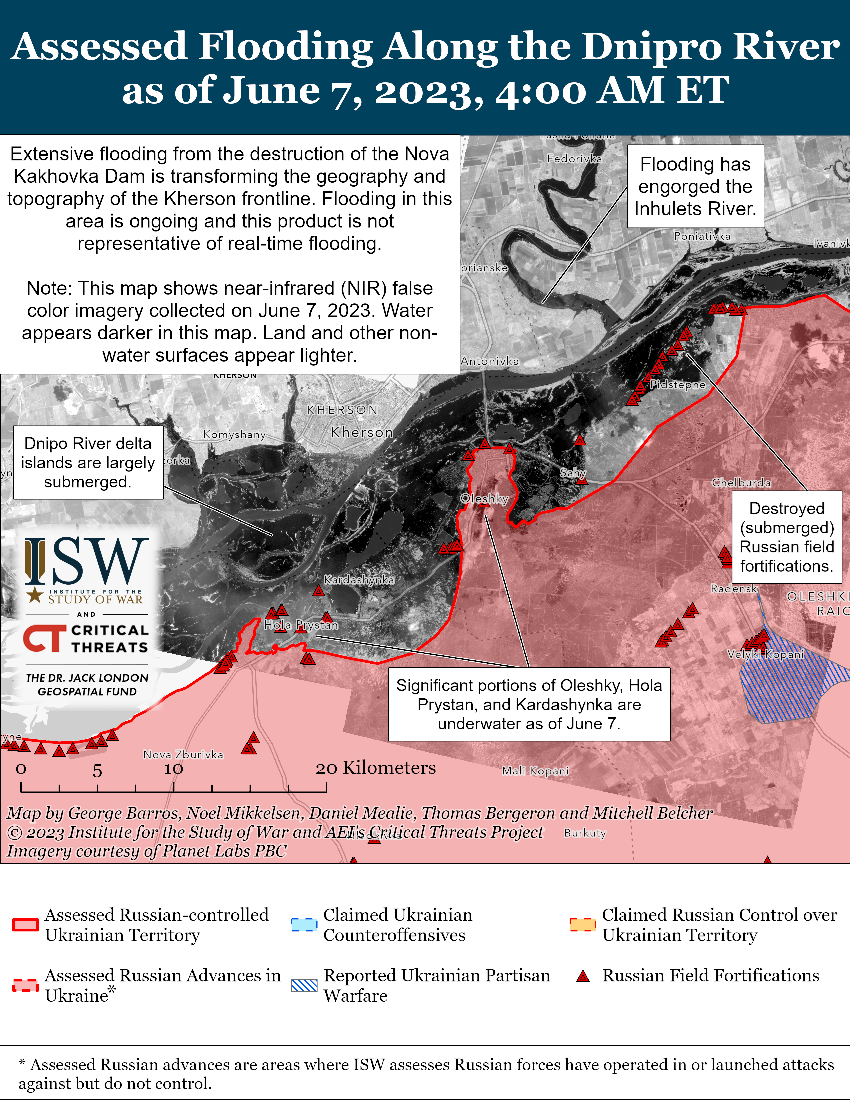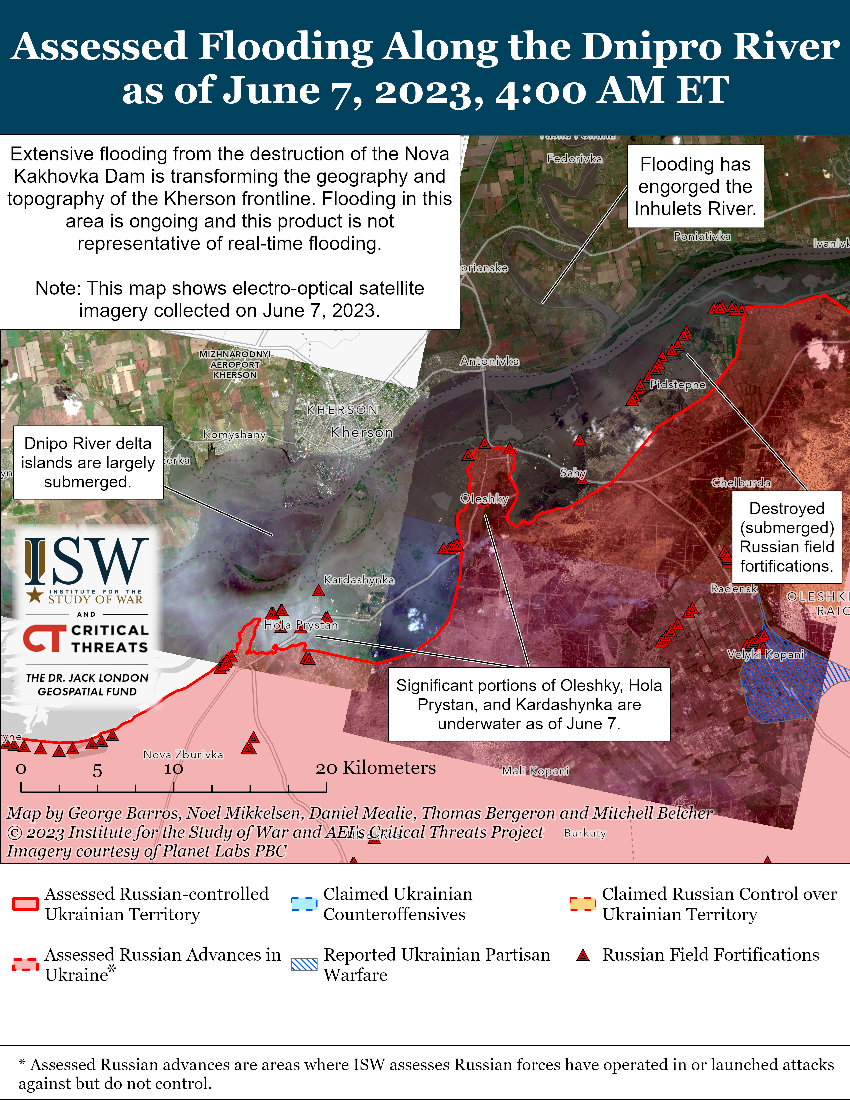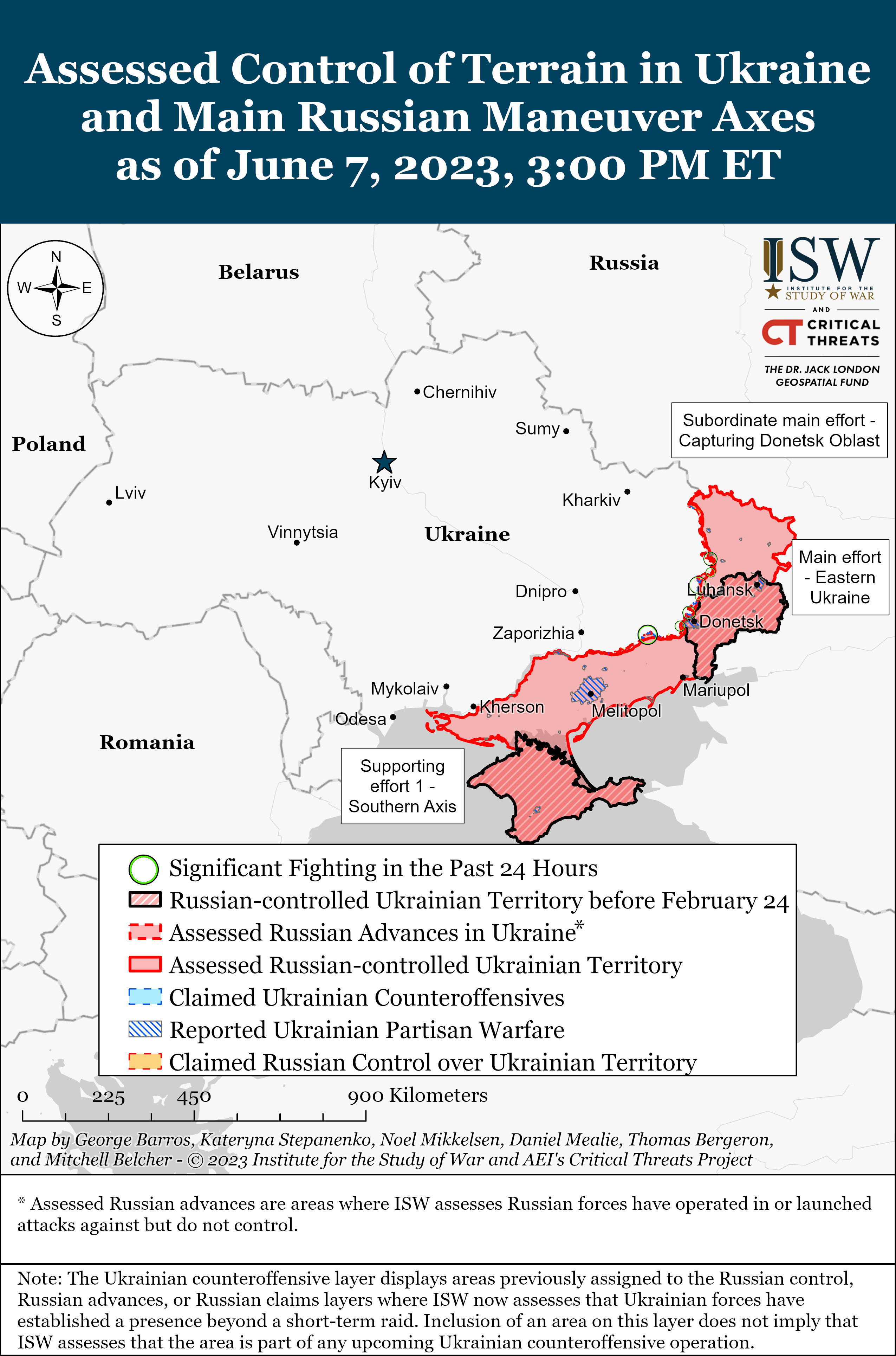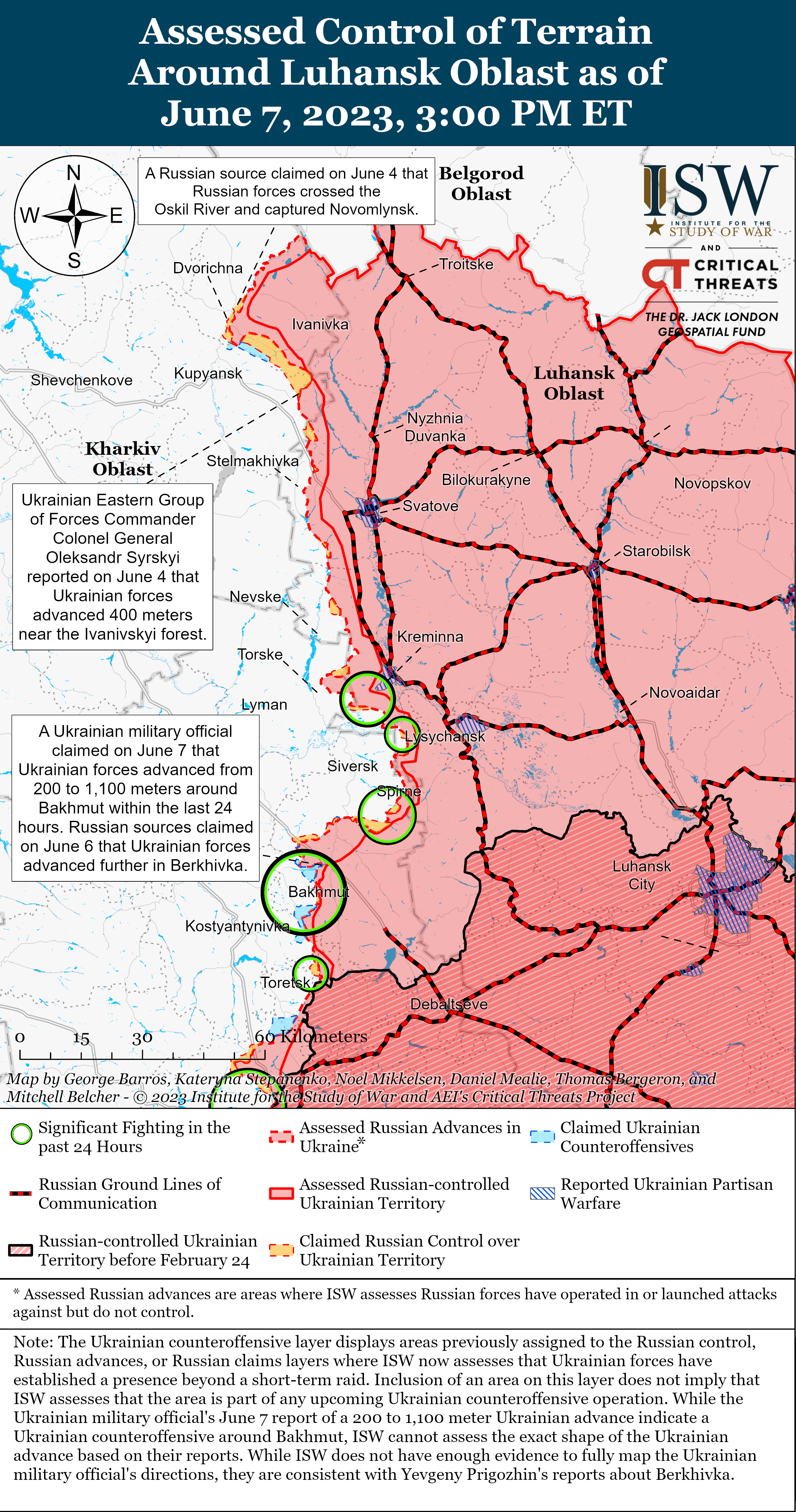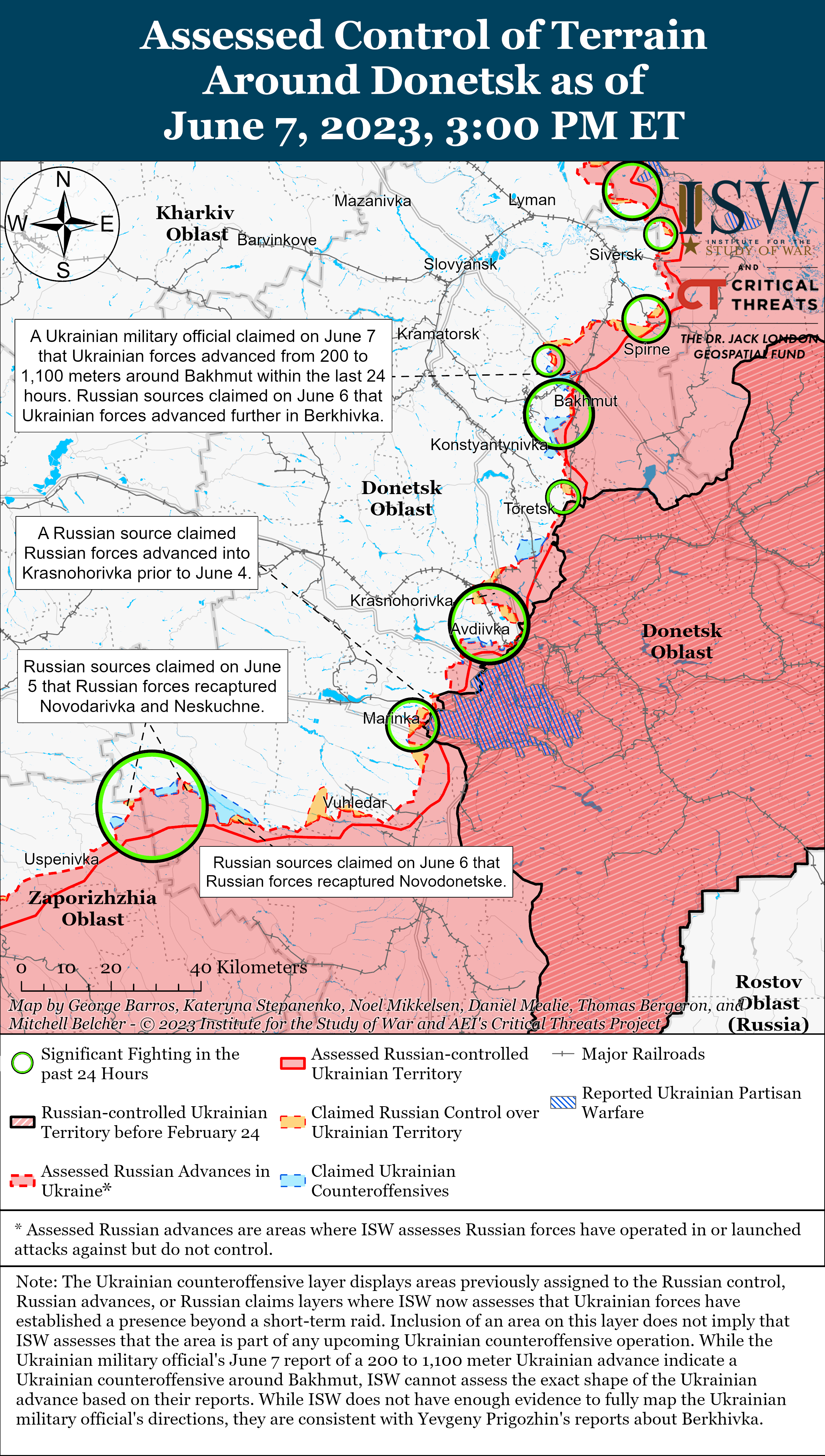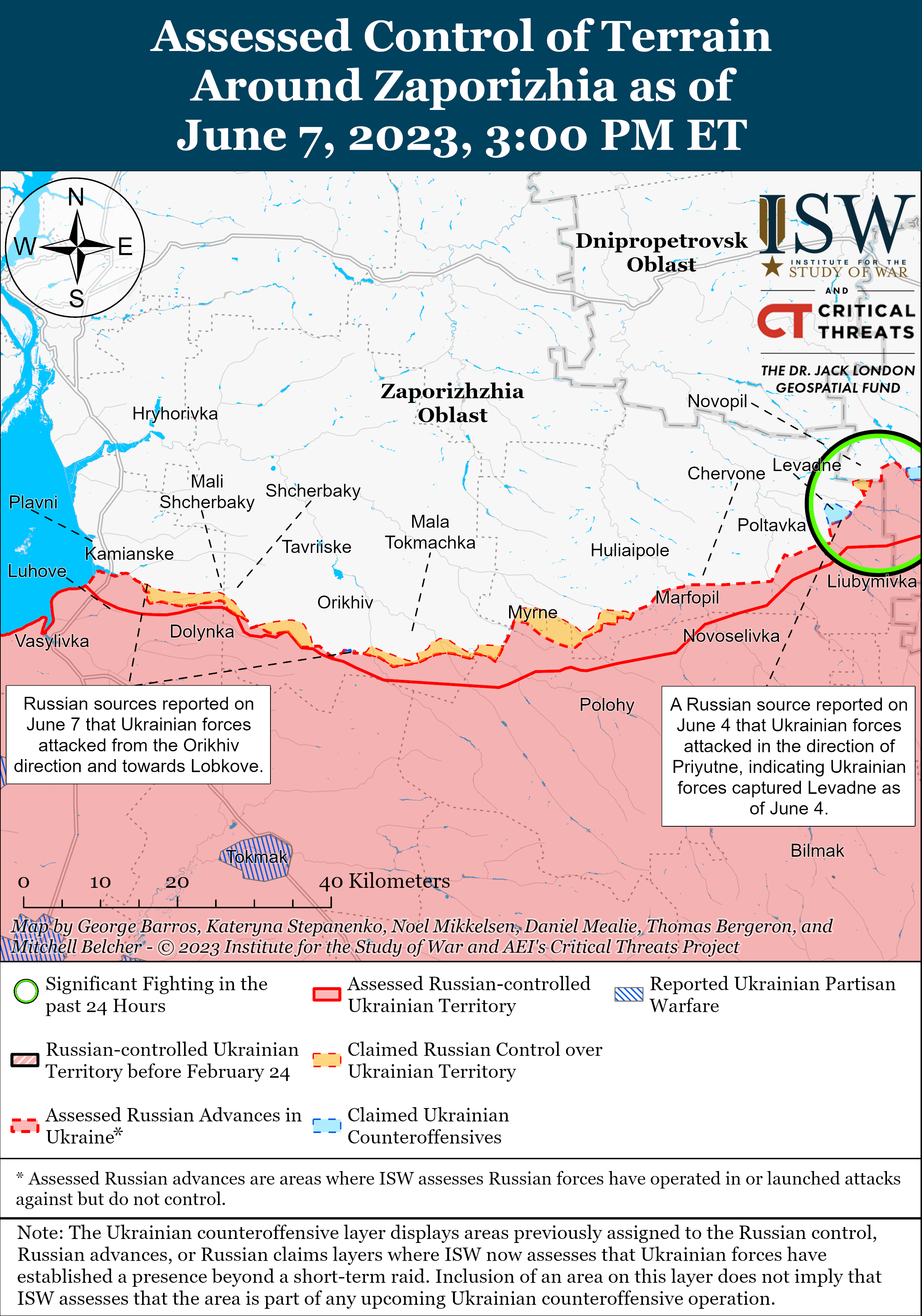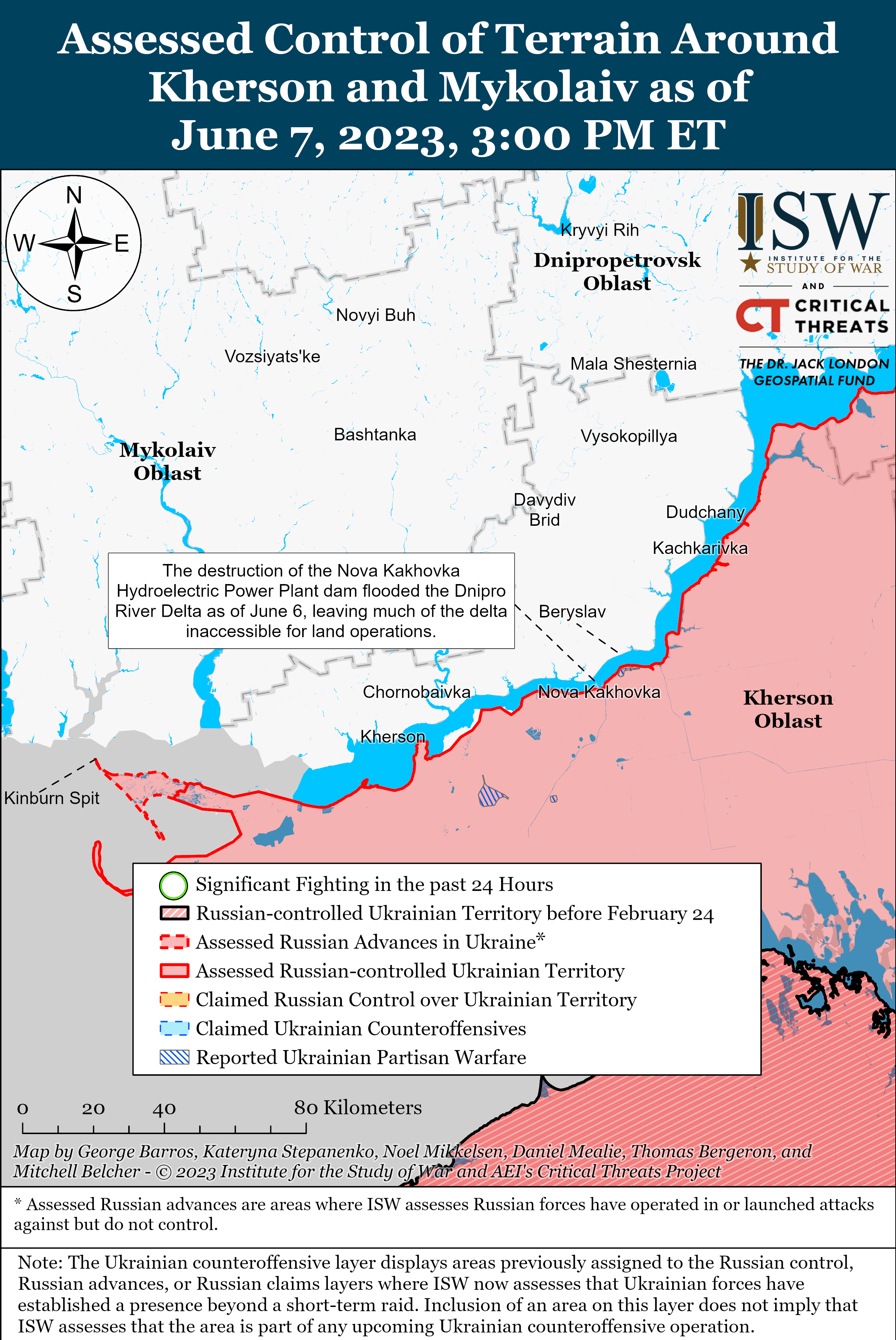 |
 |
Russian Offensive Campaign Assessment, June 7, 2023

Russian Offensive Campaign Assessment, June 7, 2023
Kateryna Stepanenko, Karolina Hird, Grace Mappes, Nicole Wolkov, George Barros, and Fredrick W. Kagan
June 7, 2023, 8:45 pm ET
Click here to see ISW’s interactive map of the Russian invasion of Ukraine. This map is updated daily alongside the static maps present in this report.
Click here to access ISW’s archive of interactive time-lapse maps of the Russian invasion of Ukraine. These maps complement the static control-of-terrain map that ISW produces daily by showing a dynamic frontline. ISW will update this time-lapse map archive monthly.
Note: The data cutoff for this product was 3pm ET on June 7. ISW will cover subsequent reports in the June 8 Russian Offensive Campaign Assessment.
The destruction of the Kakhovka Hydroelectric Power Plant (KHPP) dam is significantly changing the geography and topography of the Kherson frontline sector in southern Ukraine. Near-infrared (NIR) imagery captured at 0400 am ET on June 7 indicates that the flooding is heavily disrupting Russian prepared defensive positions on the east (left) bank of the Dnipro River – especially affecting Russian first-line positions in Hola Prystan and Oleshky. Various sources reported that Oleshky, Hola Prystan, Kozacha Laheri, and Dnipryany are almost entirely flooded with water levels rising to the height of a one-story buildings in some areas.[1] The Ukrainian headquarters established to remediate the consequences of the dam’s destruction reported that as of June 7 29 settlements are partially or fully flooded, 19 of which are located on the Ukrainian-controlled territory and 10 on Russian occupied territories.[2] Russian sources published footage indicating that water had begun receding in Nova Kakhovka and had dropped by 30cm.[3] Russian sources also claimed that water levels decreased by three to four meters in some areas from a high of 10 meters.[4] Water levels in nearby Mykolaiv City reportedly increased by 70cm as of June 7.[5] Flooding will likely worsen and further change the geography in Kherson Oblast over the next 72 hours.
The destruction of the KHPP dam is affecting Russian military positions on the eastern bank of the Dnipro River. The flooding has destroyed many Russian first line field fortifications that the Russian military intended to use to defend against Ukrainian attacks. Rapid flooding has likely forced Russian personnel and military equipment in Russian main concentration points in Oleshky and Hola Prystan to withdraw. Russian forces had previously used these positions to shell Kherson City and other settlements on the west (right bank) of Kherson. Ukrainian Southern Operational Command Spokesperson Nataliya Humenyuk stated that Russian forces relocated their personnel and military equipment from five to 15 kilometers from the flood zone, which places Russian forces out of artillery range of some settlements on the west (right bank) of the Dnipro River they had been attacking.[6] The flood also destroyed Russian minefields along the coast, with footage showing mines exploding in the flood water.[7] Kherson Oblast Occupation Head Vladimir Saldo, however, claimed that the destruction of the KHPP is beneficial to the Russian defenses because it will complicate Ukrainian advances across the river.[8] Saldo’s assessment of the situation ignores the loss of Russia’s first line of prepared fortifications. The amount of Russian heavy equipment lost in the first 24 hours of flooding is also unclear.
Ukrainian officials continued to accuse Russian forces of destroying the KHPP dam out of fear that Ukrainian forces would land on the east (left) bank Kherson Oblast. Representative of the Ukrainian Main Military Intelligence Directorate (GUR) Andriy Yusov stated that only Russian forces could have detonated the dam given its structural and engineering features and noted that Russians are “very happy that the islands, on which [Ukrainian forces] were allegedly based, were flooded.”[9] Humenyuk states that Russian forces did not consider the consequences before destroying the dam and were too concerned over a Ukrainian counteroffensive.[10] The Ukrainian General Staff similarly claimed that Russian forces detonated internal structures of the KHPP to damage the dam and thereby prevent the advance of Ukrainian forces.[11] Russian milbloggers had expressed concern about claimed Ukrainian river crossings onto the east bank the day before the destruction of the KHPP dam and on numerous occasions in the past. A Kremlin-affiliated milblogger claimed that there were active engagements between Ukrainian and Russian forces in the Dachi area on the east bank of the Dnipro River (11km southwest of Kherson City) and on the contested islands near Kherson City as of June 5.[12] The milblogger claimed that the number of Ukrainian speedboats also increased in the Dnipro Delta as of June 5. Another milblogger speculated that Ukrainian forces were attempting to establish a bridgehead by seizing the KHPP dam.[13] ISW offers no assessment of whether the Ukrainians were attempting to cross the river or for what purpose they might have sought to do so. The clear concern in the Russian military information space, however, shows that the fear of such a crossing and belief that it was either underway or imminent was present in the minds of Russians closely following the war shortly before the dam was destroyed.
The New York Times (NYT) reported that engineering and munitions experts believe that a deliberate explosion was the likely cause of KHPP dam’s collapse on June 6.[14] NYT reported that a blast within an enclosed space would cause the most damage, whereas external detonations – such as by targeted missile or artillery strikes – would only exert a fraction of the force necessary to breach the dam. The NYT quoted the experts as acknowledging that the KHPP sustained damage from military operations prior to the collapse but questioning whether this prior damage alone was sufficient to collapse the dam. NYT reported that the dam was first breached in its middle, close to the KHPP on the Russian-held east (left) riverbank, and that more of the dam collapsed throughout the day, a pattern that one expert characterized as inconsistent with the dam failing due to prior damage.
Russian forces and occupation authorities are responding to the flooding in Kherson Oblast with a great degree of disorganization and thereby exacerbating harm to the civilian population of occupied areas. Kherson Oblast Occupation Head Vladimir Saldo claimed that Russian authorities have evacuated about 1,500 people from flooded areas and established 48 temporary accommodations in occupied Zaporizhia Oblast to house them.[15] Saldo also claimed that the Kherson Occupation Administration is “almost mandatorily” sending children living in flooded areas to “recreation camps” located deeper in Russian-occupied Kherson Oblast and in occupied Crimea.[16] Saldo‘s reports of proactive efforts on the part of occupation authorities do not cohere with reports by Ukrainian officials and anecdotal evidence from the occupied east (left) bank of Kherson Oblast, however. The Ukrainian General Staff reported that Russian military personnel near Kozachi Laheri (30km southwest of the KHPP on the Russian-occupied east bank of the Dnipro River) purposefully prevented civilian populations from fleeing the area despite flooding.[17] Ukrainian Kherson Oblast Administration Advisor Serhiy Khlan stated that residents of east bank settlements are waiting on their roofs with no food or water for the occupation administration to provide aid and evacuate them, while Russian soldiers abandoned their positions and fled.[18] Russian opposition outlet Verstka reported that civilians in Russian-occupied Oleshky (53km southwest of KHPP) have waited for almost two days on roofs for volunteers and Russian Ministry of Emergency Situations employees to arrive after which they helped civilians evacuate to dry areas of Oleshky, but that Russian forces did not permit civilians to evacuate outside of Oleshky.[19] Russian forces’ and occupation authorities’ varied responses and slow reaction time indicate that they were unprepared to deal with civilian evacuations.
Civilian accounts about the lack of evacuations in Belgorod Oblast in response to the pro-Ukrainian all-Russian Russian Volunteer Corps (RDK) and Freedom of Russian Legion‘s (LSR) raids suggest a similar pattern of Russian authorities struggling to coordinate evacuations even on their own territory.[20]
Select Wagner Group-affiliated Russian senior military officers continue to posture as effective commanders to appeal to Russian President Vladimir Putin by capitalizing on high-profile military events. A Russian milblogger published a long interview with Russian Colonel “K. Zalessky” in which Zalessky claimed that Russian Airborne Forces (VDV) Commander Colonel General Mikhail Teplinsky played a decisive role in Russian forces’ ability to defend against the ongoing Ukrainian localized counterattacks near Velyka Novosilka, Donetsk Oblast.[21] Zalessky confirmed prior claims that Teplinsky became an overall theater deputy commander responsible for southern Ukraine as of April 1 and praised Teplinsky for being intimately involved in Russian defensive preparations west of Vuhledar and throughout the south.[22] The interview notably portrays the Russian defense against these localized Ukrainian attacks as a significant undertaking, contrasting with some Russian milblogger claims that these Ukrainian operations constitute a reconnaissance-in-force and were not part of a main counteroffensive effort.[23]
The pro-Teplinsky interview is likely part of an information operation aimed at undermining the Russian Ministry of Defense (MoD). Zalessky claimed that Teplinsky praised the commanders of the 5th Combined Arms Army and 36th Combined Arms Army (both of the Eastern Military District) for their defensive efforts in the Velyka Novosilka area but claimed that not all of the Russian military command displayed similar bravery.[24] Zalessky claimed that Teplinsky personally arrayed Russian formations across their defensive lines, inspected battalions, and trained personnel, echoing Wagner Group financier Yevgeny Prigozhin’s June 6 criticisms that MoD officials need to visit the front lines.[25] The interview was published almost immediately after the MoD claimed that Chief of the Russian General Staff Army General Valery Gerasimov took command of Russian operations in the south on June 5, and after Russian Defense Minister Sergei Shoigu characterized the defense as an MoD success on June 6.[26] Shoigu notably also praised elements of the 5th and 36th Combined Arms armies but failed to visit them on the frontlines as Teplinsky reportedly did.[27] Teplinsky notably had to use a Russian milblogger to claim credit for repelling claimed Ukrainian attacks in eastern Zaporizhia and western Donetsk oblasts. The MoD has previously blocked Wagner-affiliated commanders from being featured on official platforms.[28] It is noteworthy that Russian commanders and senior military leaders appear to prioritize public posing in the midst of ongoing significant military operations and major catastrophes.
Wagner-affiliated commanders’ reactive public relations campaigns may not be sufficient to deflect from battlefield realities. Though some large milbloggers amplified the Teplinsky interview on June 7, the broader Russian information space remained saturated with tactical claims of Ukrainian counterattacks near Velyka Novosilka and with the Kakhovka Hydroelectric Power Plant (KHPP) dam disaster.[29]
Key Takeaways
- The destruction of the Kakhovka Hydroelectric Power Plant (KHPP) dam is significantly changing the geography and topography of the Kherson frontline sector in southern Ukraine.
- Ukrainian officials continued to accuse Russian forces of destroying the KHPP dam out of fear that Ukrainian forces would land on the east (left) bank Kherson Oblast.
- The New York Times (NYT) reported that engineering and munitions experts believe that a deliberate explosion was the likely cause of KHPP dam’s collapse on June 6.
- Russian forces and occupation authorities are responding to the flooding in Kherson Oblast with a great degree of disorganization and thereby exacerbating harm to the civilian population of occupied areas.
- Select Wagner Group-affiliated Russian senior military officers continue to posture as effective commanders to appeal to Russian President Vladimir Putin by capitalizing on high-profile military events.
- The pro-Teplinsky interview is likely part of an information operation aimed at undermining the Russian Ministry of Defense (MoD).
- Wagner-affiliated commanders’ reactive public relations campaigns may not be sufficient to deflect from battlefield realities.
- Russian and Ukrainian officials each accused the other state of damaging an ammonia pipeline that runs through Kharkiv Oblast and causing an ammonia leak.
- Russian forces continued to conduct ground attacks around Kreminna.
- Ukrainian officials indicated that Ukrainian forces are conducting offensive operations in the Bakhmut direction as of June 7.
- Russian forces continued limited ground attacks along the Avdiivka-Donetsk City line.
- Russian sources continued to claim that Ukrainian forces conducted ground attacks on the administrative border between Donetsk and Zaporizhia oblasts on June 7.
- Russian and Ukrainian forces reportedly engaged in skirmishes in western Zaporizhia Oblast.
- Russian authorities continue to restrict international travel for those eligible for military service.
- Russian officials and occupation authorities continue to establish patronage programs between Russian regions and occupied territories in order to integrate occupied territories into Russia.
We do not report in detail on Russian war crimes because these activities are well-covered in Western media and do not directly affect the military operations we are assessing and forecasting. We will continue to evaluate and report on the effects of these criminal activities on the Ukrainian military and the Ukrainian population and specifically on combat in Ukrainian urban areas. We utterly condemn these Russian violations of the laws of armed conflict, Geneva Conventions, and humanity even though we do not describe them in these reports.
- Russian Main Effort – Eastern Ukraine (comprised of two subordinate main efforts)
- Russian Subordinate Main Effort #1 – Capture the remainder of Luhansk Oblast and push westward into eastern Kharkiv Oblast and encircle northern Donetsk Oblast
- Russian Subordinate Main Effort #2 – Capture the entirety of Donetsk Oblast
- Russian Supporting Effort – Southern Axis
- Russian Mobilization and Force Generation Efforts
- Activities in Russian-occupied areas
Russian Main Effort – Eastern Ukraine
Russian Subordinate Main Effort #1 – Luhansk Oblast (Russian objective: Capture the remainder of Luhansk Oblast and push westward into eastern Kharkiv Oblast and northern Donetsk Oblast)
Russian and Ukrainian officials each accused the other state of damaging an ammonia pipeline that runs through Kharkiv Oblast and of causing an ammonia leak. Geolocated footage shows a large cloud of ammonia leaking from a section of the Togliatti-Odesa ammonia pipeline just south of Masyutivka, Kharkiv Oblast (12km northeast of Kupyansk).[30] Ukrainian Kharkiv Oblast Head Oleh Synehubov reported that Russian forces fired six shells at the pipeline and that Russian forces previously targeted the pipeline with artillery fire on June 5 and 6.[31] The Russian Ministry of Defense (MoD) claimed that Ukrainian forces deliberately mined the area at night on June 5.[32] Russian Ministry of Foreign Affairs (MFA) Spokesperson Maria Zakharova claimed that repairs to the pipeline will take one to three months.[33] Russian and Ukrainian forces have recently conducted engagements near Masyutivka.[34] ISW has previously reported that Russian officials have set informational conditions to accuse Ukraine of using chemical weapons or of conducting false flag attacks using chemical or radiological weapons.[35]
Russian forces continued to conduct ground attacks around Kreminna on June 7. The Ukrainian General Staff reported that Russian forces conducted unsuccessful offensive operations near Kreminna itself and south of Kreminna near Bilohorivka (10km south), Berestove (30km south), and Vesele (32km south).[36] A Russian source claimed that Russian forces attacked Novoselivske (13km northeast of Svatove) and advanced near Bilohorivka on June 6.[37]
Russian Subordinate Main Effort #2 – Donetsk Oblast (Russian Objective: Capture the entirety of Donetsk Oblast, the claimed territory of Russia’s proxies in Donbas)
Click here to read ISW’s retrospective analysis on the Battle for Bakhmut.
Ukrainian officials indicated that Ukrainian forces are conducting offensive operations in the Bakhmut direction as of June 7. Ukrainian Deputy Defense Minister Hanna Malyar stated on June 7 that Ukrainian forces near Bakhmut have transferred from defensive to offensive operations and have advanced from 200 to 1,000m in various unspecified areas over the past day.[38] Malyar also noted that Russian forces are deploying reserves to Bakhmut to prepare to conduct a defense-in-depth and that some Wagner elements are remaining in the Russian rear.[39] Ukrainian Eastern Group of Forces Commander Colonel General Oleksandr Syrskyi stated that Ukrainian forces are advancing on the flanks of Bakhmut and that Russian forces are losing certain unspecified positions.[40] Russian milbloggers claimed that Ukrainian troops are conducting counterattacks southwest of Bakhmut near Klishchiivka (6km southwest), northwest of Bakhmut near Orikhovo-Vasylivka (10km northwest) and in the Berkhivka area (6km northwest), and northeast of Bakhmut near Yakovlivka (15km northeast).[41] The Russian Ministry of Defense (MoD) claimed that Russian troops repelled Ukrainian attacks on several settlements on the outskirts of Bakhmut.[42] The Ukrainian General Staff reported that Russian forces conducted unsuccessful offensive operations towards Klishchiivka, Orikhovo-Vasylivka, Ivanivske (5km southwest of Bakhmut), and Pivnichne (20km southwest of Bakhmut).[43]
Russian forces continued limited ground attacks along the Avdiivka-Donetsk City line on June 7. The Ukrainian General Staff reported that Russian forces conducted unsuccessful offensive operations towards Avdiivka and that Ukrainian forces repelled 13 Russian ground attacks in Marinka (on the southwestern outskirts of Donetsk City).[44] Russian milbloggers claimed that Ukrainian forces counterattacked on the northwestern outskirts of Donetsk City near Nevelske, Vodyane, and Opytne and that Ukrainian forces retreated from near Opytne with losses.[45] The Russian MoD claimed that Russian forces struck and destroyed two Ukrainian fuel depots in Avdiivka.[46]
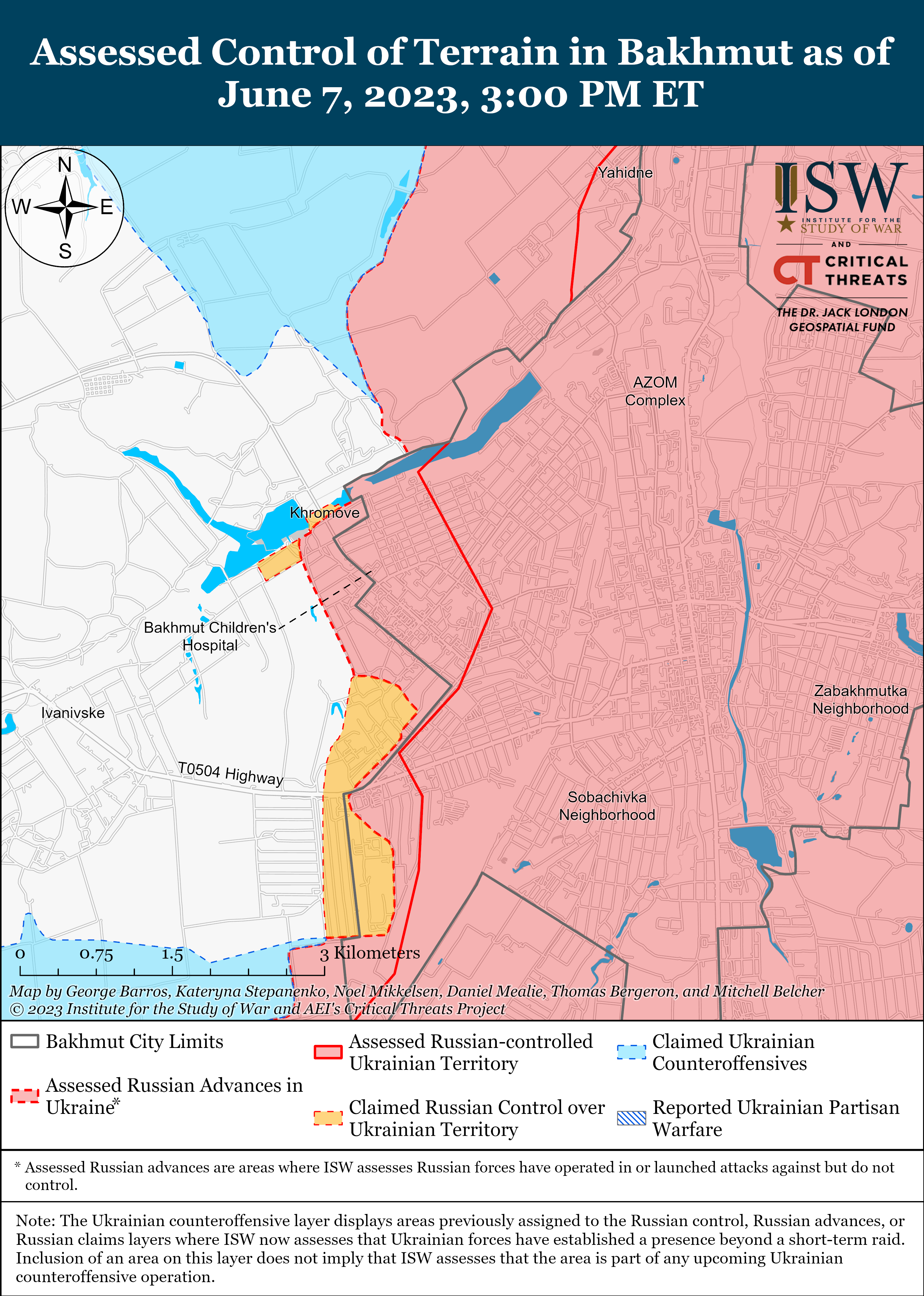
Russian Supporting Effort – Southern Axis (Russian objective: Maintain frontline positions and secure rear areas against Ukrainian strikes)
Russian sources continued to claim that Ukrainian forces conducted ground attacks on the administrative border between Donetsk and Zaporizhia oblasts on June 7. The Russian Ministry of Defense (MoD) claimed that Russian forces repelled Ukrainian attacks southwest of Velyka Novosilka and reiterated that Russian forces control Novodonetske (12km southeast of Velyka Novosilka).[47] Russian sources claimed that Russian forces repelled renewed Ukrainian attacks on Novodonetske on June 6 and claimed that Ukrainian forces had “varying successes” southwest of Velyka Novosilka.[48] A Russian milblogger claimed that a Ukrainian tactical group advanced by one kilometer and reached a tactical height southwest of Velyka Novosilka.[49] Russian Colonel “K. Zalessky” reported that Eastern Military (EMD) elements of the 60th Separate Motorized Rifle Brigade (5th Combined Arms Army) and the 127th Motorized Rifle Division (5th Combined Arms Army) – namely the 143rd Motorized Rifle Regiment, 114th Guards Motorized Rifle Regiment, and the 394th Motorized Rifle Regiment – are operating in the Vremivka-Velyka Novosilka directions.[50] Zalessky added that the Russian 37th Separate Guards Motorized Rifle Brigade (36th Combined Arms Army, EMD), elements of the Donetsk People’s Republic Militia (DNR) Operational-Combat Tactical Formation ”Kaskad,” and other unspecified DNR units repelled Ukrainian attacks on the Velyka Novosilka frontline.[51] Zalessky noted that elements of the 29th Combined Arms Army previously stopped Ukrainian advances in the Pavlivka area (45km southwest of Donetsk City).[52]
Russian and Ukrainian forces reportedly engaged in skirmishes in western Zaporizhia Oblast on June 7. Russian milbloggers claimed that Ukrainian forces unsuccessfully attempted to advance into settlements south and southwest of Orikhiv.[53] Russian sources also claimed that fighting is ongoing southwest of Orikhiv.[54] A Wagner-affiliated milblogger claimed that elements of the Southern Military District’s 291st Guards Motorized Rifle Regiment and 70th Guards Motorized Rifle Regiment (both part of the 42nd Motorized Rifle Division, 58th Combined Arms Army) repelled Ukrainian attacks on the Orikhiv-Tokmak-Melitopol line.[55] Russian milbloggers claimed that unspecified Russian reconnaissance and special forces continue to defend Russian positions in western Zaporizhia Oblast.[56]
Russian and Ukrainian sources reported explosions in occupied territories in Zaporizhia and Donetsk oblasts on June 7. Ukrainian Melitopol Mayor Ivan Fedorov reported a loud explosion in Myrne, Melitopol Raion and six explosions in Tokmak.[57] Zaporizhia Oblast occupation official Vladimir Rogov claimed that Ukrainian forces struck a foundry shop in Molochansk southwest of Tokmak.[58] Ukrainian Mariupol Mayoral Advisor Petro Andryushenko amplified local reports about explosions northeast and southwest of Mariupol.[59] Andryushenko also reported an increase of Russian aviation activity over Mariupol on June 7.[60] Russian forces reported shelling Ukrainian positions along the southern frontline.[61]
Russian Mobilization and Force Generation Efforts (Russian objective: Expand combat power without conducting general mobilization)
Russian authorities continue to restrict international travel for those eligible for military service. The Russian Federation Council approved a law on June 7 that clarifies rules on declaring Russian passports invalid and introduces travel restrictions on certain categories of citizens.[62] The law holds that the Russian Ministry of Internal Affairs can essentially take passports for “storage" (confiscate them) for citizens who are restricted from leaving Russia due to conscription for military service or alternative civilian service.[63] Such legislative manipulations are likely aimed at maintaining a force generation pool and preventing Russians from fleeing abroad to avoid military service.
Russian regional governments continue efforts to incentivize military service. Russian opposition outlet Mobilization News reported on June 7 that the Leningrad Oblast Legislative Assembly adopted a bill that will give all those who signed contracts to fight in Ukraine a 5-acre plot of land starting on June 1, 2023.[64]
The Russian MoD continues efforts to present the Russian defense industrial base (DIB) as an effective wartime organism. Russian Minister of Defense Sergei Shoigu visited the Almaz Antey arms industry enterprise on June 7 to inspect the enterprise’s fulfilment of the state defense order.[65] Shoigu visited anti-aircraft missile production workshops and called for increased synchronization between commissioning orders for new equipment and the production of those models.[66] Almaz Antey General Director Yan Nivkov in turn reported to Shoigu that the creation of new production facilities at the enterprise will double production output.[67]
Russian milbloggers criticized the Russian MoD for falsely claiming that Russian troops destroyed a Leopard tank in Ukraine. The Russian MoD posted footage June 6 that claims to show a Russian strike destroying a Leopard tank.[68] Russian milbloggers were quick to notice, however, that closer examination of the footage shows that the object resembles a piece of agricultural equipment and suggested that Russian forces actually destroyed a John Deere tractor.[69] Several Russian milbloggers criticized the MoD for posting the footage and urged Russian military authorities to vet their public posts more carefully.[70] Wagner Group financier Yevgeny Prigozhin sardonically congratulated the Russian MoD for a “job well done” in reference to the tractor.[71]
Activities in Russian-occupied areas (Russian objective: Consolidate administrative control of annexed areas; forcibly integrate Ukrainian civilians into Russian sociocultural, economic, military, and governance systems)
Russian officials and occupation authorities continue to establish patronage programs between Russian regions and occupied territories in order to integrate occupied territories into Russia. Zaporizhia Oblast Occupation Head Yevgeny Balitsky met with North Ossetia-Alania Republic Head Sergey Melyailo on June 7 to discuss a patronage program with Chernihivskyi Raion in occupied Zaporizhia Oblast.[72] Balitsky claimed that the North Ossetia-Alania will first help to restore a secondary school and a temple. Balitsky also requested that North Ossetia-Alania send doctors and social workers to Chernihivkskyi Raion and that North Ossetia-Alania establish a recreation program in the Republic for children from Zaporizhia Oblast.
Significant activity in Belarus (ISW assesses that a Russian or Belarusian attack into northern Ukraine is extraordinarily unlikely).
ISW will continue to report daily observed Russian and Belarusian military activity in Belarus, but these are not indicators that Russian and Belarusian forces are preparing for an imminent attack on Ukraine from Belarus. ISW will revise this text and its assessment if it observes any unambiguous indicators that Russia or Belarus is preparing to attack northern Ukraine.
The Russian military likely redeployed a significant number of its forces that were training in Belarus to Ukraine or staging areas near Ukraine ahead of Ukraine’s counteroffensive. Ukraine’s State Border Service Spokesman Andriy Demchenko stated on June 7 that as of the beginning of June there are approximately 1,000 Russian military personnel in Belarus.[73] This is a sharp decrease from spring 2023, when Ukrainian officials reported that about 9,000-10,000 Russian troops were in Belarus as of March 30.[74]
Note: ISW does not receive any classified material from any source, uses only publicly available information, and draws extensively on Russian, Ukrainian, and Western reporting and social media as well as commercially available satellite imagery and other geospatial data as the basis for these reports. References to all sources used are provided in the endnotes of each update.
[1] https://t.me/rybar/48127; https://t.me/rybar/48152; https://t.me/epoddubny/16281https://t.me/basurin_e/2628; https://t.me/svobodnieslova/2082; https://t.me/vanek_nikolaev/15174; https://twitter.com/666_mancer/status/1666407915857518593; https://twitter.com/Militarylandnet/status/1666333016967315456?s=20; https://t.me/readovkanews/60306; https://twitter.com/IntelCrab/status/1666484166874079232?s=20; https://t.me/m0sc0wcalling/25182
[2] https://armyinform dot com.ua/2023/06/07/pidtopleno-29-punktiv-evakujovano-ponad-1500-lyudej-pershi-pidsumky-shtabu-z-likvidacziyi-naslidkiv-pidryvu-kahovskoyi-ges/
[3] https://t.me/astrapress/29006; https://t.me/vrogov/10091; https://t.me/wargonzo/13030
[4] https://t.me/wargonzo/13027
[5] https://t.me/senkevichonline/4623
[6] https://armyinform dot com.ua/2023/06/07/na-livomu-berezi-dnipra-hersonshhyny-vorog-vidtyagnuv-svoyi-syly-na-5-15-kilometriv-ta-prodovzhuye-gatyty-po-oblasnomu-czentru-nataliya-gumenyuk/; https://suspilne dot media/499231-ocevidno-armia-rf-ne-rozrahuvala-naslidki-akih-zavdast-pidriv-kahovskoi-ges-gumenuk/
[7] https://t.me/vrogov/10091
[8] https://twitter.com/Gerashchenko_en/status/1666503125753012230
[9] https://armyinform.com dot ua/2023/06/07/pidryv-kahovskoyi-ges-czej-terakt-rosiya-gotuvala-dovgo-gur/
[10] https://suspilne dot media/499231-ocevidno-armia-rf-ne-rozrahuvala-naslidki-akih-zavdast-pidriv-kahovskoi-ges-gumenuk/
[11] https://www.facebook.com/GeneralStaff.ua/posts/pfbid0byxfZYaK62wBcFHHShAVsvT2BxiERhszDmk7Xwui1GQtgQjpQVAezsGqw1ggNdsLl
[12] https://t.me/rybar/48052
[13] https://t.me/rybar/48056
[14] https://www.nytimes.com/2023/06/06/world/europe/ukraine-kakhovka-dam-russia.html
[15] https://t.me/VGA_Kherson/9970; https://t.me/SALDO_VGA/852; https://t.me/VGA_Kherson/9954; https://t.me/aakherson/356
[16] https://t.me/SALDO_VGA/850; https://t.me/VGA_Kherson/9952
[17] https://www.facebook.com/GeneralStaff.ua/posts/pfbid0afjQN5md5u63joFS3BaL9BPbCcPJ5BM1gaH2yGczUzH4Bz4SBMejFmRBstMuforBl
[18] https://www.facebook.com/sergey.khlan/posts/pfbid09ZR46k257dpatM68fRSMM8nunrZnX2hQ47QR2q3gba2eXRtsLebLWpAFkxR6SBdel
[19] https://t.me/svobodnieslova/2087
[20] https://t.me/bbcrussian/47490; https://t.me/sotaproject/60428
[21] https://t.me/boris_rozhin/88170; https://t.me/rybar/48132; https://t.me/komdiv_76/1381; https://t.me/boris_rozhin/88208; https://t.me/boris_rozhin/88210; https://t.me/boris_rozhin/88220
[22] https://www.understandingwar.org/backgrounder/russian-offensive-campaign-assessment-april-30-2023
[23] https://www.understandingwar.org/backgrounder/russian-offensive-campaign-assessment-june-4-2023; https://www.understandingwar.org/backgrounder/russian-offensive-campaign-assessment-june-5-2023; https://www.understandingwar.org/backgrounder/russian-offensive-campaign-assessment-june-6-2023; https://t.me/boris_rozhin/88170; https://t.me/rybar/48132; https://t.me/komdiv_76/1381; https://t.me/boris_rozhin/88208; https://t.me/boris_rozhin/88210; https://t.me/boris_rozhin/88220
[24] https://t.me/boris_rozhin/88170; https://t.me/rybar/48132; https://t.me/komdiv_76/1381; https://t.me/boris_rozhin/88208; https://t.me/boris_rozhin/88210; https://t.me/boris_rozhin/88220
[25] https://t.me/concordgroup_official/1167
[26] https://www.understandingwar.org/backgrounder/russian-offensive-campaign-assessment-june-6-2023; https://www.understandingwar.org/backgrounder/russian-offensive-campaign-assessment-june-5-2023
[27] https://www.understandingwar.org/backgrounder/russian-offensive-campaign-assessment-june-6-2023
[28] https://www.understandingwar.org/sites/default/files/Russian%20Offensive%20Campaign%20Assessment%2C%20May%202%2C%202023%20%28PDF%29.pdf
[29] https://t.me/boris_rozhin/88170; https://t.me/rybar/48132; https://t.me/komdiv_76/1381; https://t.me/boris_rozhin/88208; https://t.me/boris_rozhin/88210; https://t.me/boris_rozhin/88220
[30] https://twitter.com/LoLManya/status/1666186471512973313; https://t.me/poiskinfy/16586; https://twitter.com/GeoConfirmed/status/1666368037883113474; https://twitter.com/LoLManya/status/1666186994114764803; https://t.me/readovkanews/60309
[31] https://t.me/astrapress/29024; https://twitter.com/KyivIndependent/status/1666164187091836935
[32] https://t.me/mod_russia/27177; https://t.me/vysokygovorit/11869; https://t.me/astrapress/29030
[33] https://m.gazeta dot ru/social/news/2023/06/07/20616458.shtml; https://t.me/readovkanews/60316
[34] https://www.understandingwar.org/backgrounder/russian-offensive-campaign-assessment-may-15-2023; https://understandingwar.org/backgrounder/russian-offensive-campaign-assessment-may-29-2023; https://understandingwar.org/backgrounder/russian-offensive-campaign-assessment-june-1-2023; https://www.understandingwar.org/backgrounder/russian-offensive-campaign-assessment-may-14-2023; https://www.understandingwar.org/backgrounder/russian-offensive-campaign-assessment-may-28-2023; https://understandingwar.org/backgrounder/russian-offensive-campaign-assessment-june-2-2023; https://www.understandingwar.org/backgrounder/russian-offensive-campaign-assessment-may-27-2023; https://understandingwar.org/backgrounder/russian-offensive-campaign-assessment-may-30-2023; https://understandingwar.org/backgrounder/russian-offensive-campaign-assessment-may-26-2023
[35] https://understandingwar.org/backgrounder/warning-update-russia-may-conduct-chemical-or-radiological-false-flag-attack-pretext; https://understandingwar.org/backgrounder/ukraine-invasion-update-25; https://www.understandingwar.org/sites/default/files/Russian%20Offensive%20Campaign%20Assessment%20April%208%202023.pdf
[36] https://understandingwar.org/backgrounder/russian-offensive-campaign-assessment-may-26-2023; https://www.facebook.com/GeneralStaff.ua/posts/pfbid0afjQN5md5u63joFS3BaL9BPbCcPJ5BM1gaH2yGczUzH4Bz4SBMejFmRBstMuforBl
[37] https://t.me/readovkanews/60292
[38] https://t.me/annamaliar/818
[39] https://t.me/annamaliar/818
[40] https://t.me/osirskiy/103
[41] https://t.me/readovkanews/60292; https://t.me/wargonzo/13013; https://t.me/boris_rozhin/88206
[42] https://t.me/mod_russia/27174
[43] https://www.facebook.com/GeneralStaff.ua/posts/pfbid0byxfZYaK62wBcFHHShAVsvT2BxiERhszDmk7Xwui1GQtgQjpQVAezsGqw1ggNdsLl; https://www.facebook.com/GeneralStaff.ua/posts/pfbid0afjQN5md5u63joFS3BaL9BPbCcPJ5BM1gaH2yGczUzH4Bz4SBMejFmRBstMuforBl
[44] https://www.facebook.com/GeneralStaff.ua/posts/pfbid0byxfZYaK62wBcFHHShAVsvT2BxiERhszDmk7Xwui1GQtgQjpQVAezsGqw1ggNdsLl; https://www.facebook.com/GeneralStaff.ua/posts/pfbid0afjQN5md5u63joFS3BaL9BPbCcPJ5BM1gaH2yGczUzH4Bz4SBMejFmRBstMuforBl
[45] https://t.me/voenkorKotenok/48283; https://t.me/wargonzo/13013; https://t.me/boris_rozhin/88176; https://t.me/epoddubny/16273; https://t.me/epoddubny/16272; https://t.me/wargonzo/13008; https://t.me/RVvoenkor/46786; https://t.me/RVvoenkor/46777
[46] https://t.me/mod_russia/27175
[47] https://t.me/mod_russia/27174
[48] https://t.me/readovkanews/60292 https://t.me/RVvoenkor/46819; https://t.me/RVvoenkor/46841; https://t.me/rybar/48128; https://t.me/wargonzo/13013; https://t.me/negumanitarnaya_pomosch_Z/7863 ; https://t.me/z_arhiv/21875
[49] https://t.me/negumanitarnaya_pomosch_Z/7863; https://t.me/z_arhiv/21875
[50] https://t.me/boris_rozhin/88208
[51] https://t.me/boris_rozhin/88210
[52] https://t.me/boris_rozhin/88210
[53] https://t.me/vrogov/10109; https://t.me/bazabazon/18384; https://t.me/Sladkov_plus/7847; https://t.me/Sladkov_plus/7849 ; https://t.me/readovkanews/60312; https://t.me/wargonzo/13026; were large. https://t.me/milchronicles/2019; https://t.me/rusich_army/9237; https://t.me/NeoficialniyBeZsonoV/26263; https://t.me/bazabazon/18384; https://t.me/rybar/48170 https://t.me/wargonzo/13036; https://t.me/bazabazon/18384; https://t.me/rybar/48158
[54] https://t.me/negumanitarnaya_pomosch_Z/7863; https://t.me/z_arhiv/21875; https://t.me/rybar/48158
[55] https://t.me/z_arhiv/21871
[56] https://t.me/RVvoenkor/46826; https://t.me/RVvoenkor/46823 ; https://t.me/RVvoenkor/46822
[57] https://t.me/ivan_fedorov_melitopol/2180; https://t.me/andriyshTime/10502
[58] https://t.me/vrogov/10103
[59] https://t.me/andriyshTime/10516
[60] https://t.me/andriyshTime/10540; https://t.me/andriyshTime/10518
[61] https://t.me/vrogov/10109; https://t.me/bazabazon/18384
[62] https://www.interfax dot ru/russia/905212; https://sozd.duma dot gov.ru/bill/1231732-7
[63] https://www.interfax.ru/russia/905212
[64] https://t.me/mobilizationnews/12586
[65] https://t.me/mod_russia/27173
[66] https://t.me/mod_russia/27173
[67] https://t.me/mod_russia/27173
[68] https://t.me/rian_ru/204891
[69] https://t.me/milinfolive/101771; https://t.me/rybar/48121; https://t.me/Sladkov_plus/7846
[70] https://t.me/rybar/48121; https://t.me/milinfolive/101771; https://t.me/Sladkov_plus/7846
[71] https://t.me/Prigozhin_hat/3629; https://t.me/Prigozhin_hat/3630
[72] https://t.me/BalitskyEV/1167
[73] https://suspilne dot media/500251-u-bilorusi-zalisautsa-blizko-tisaci-rosijskih-vijskovih-dpsu/
[74] https://www.understandingwar.org/backgrounder/russian-offensive-campaign-assessment-march-30-2023
